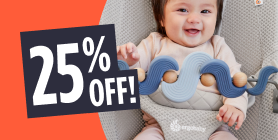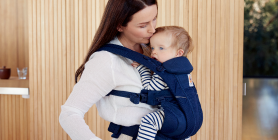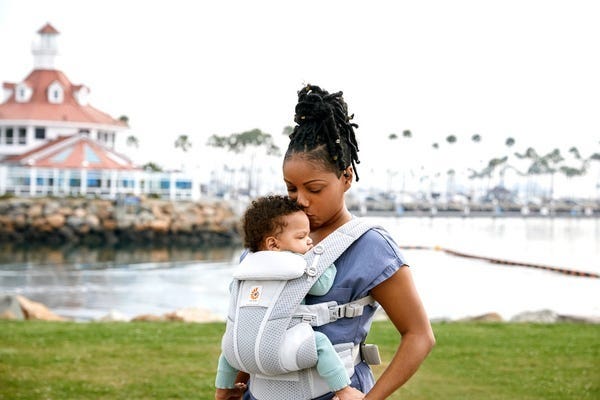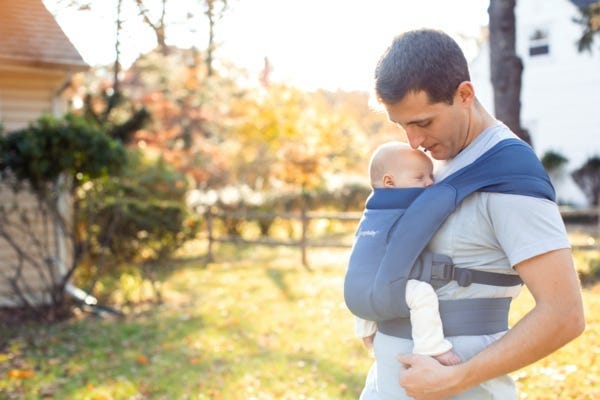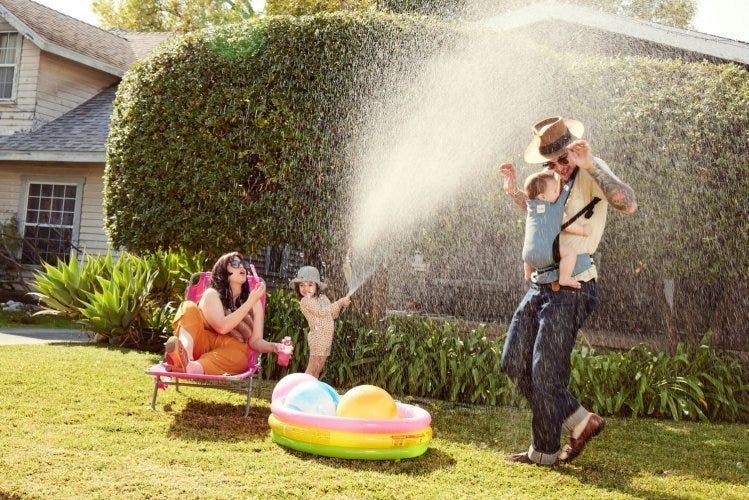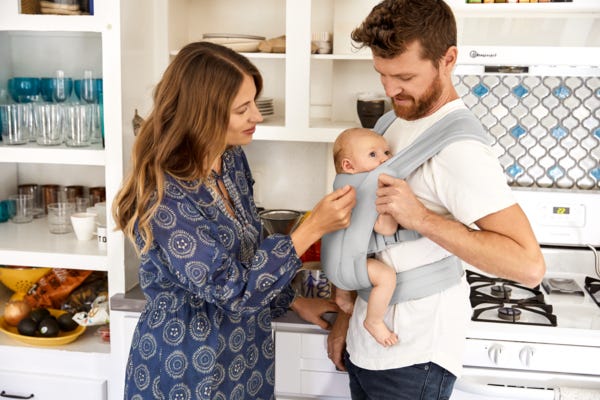
Having a baby is a beautiful and exciting stage of anyone’s life. However, it can be taxing emotionally and physically for your partner. We can read all the books and attend all the courses, but sometimes there are just the things no one tells you. Your partner will need all the help they can get, but sometimes it can be hard to know how exactly to help them. Here are a few ways that you might be able to help your partner after they give birth.
Caring for Your Partner During Labor and Delivery
- Get drinks or ice from the machine - If you are having a hospital birth, chances are your partner won't be able to eat solid foods. Ice is always a welcome alternative to water as a change in texture.
- Remind the partner to drink water - "Your body needs to be nourished and in top condition before and during the race. Days leading up to the marathon, long-distance runners will load up so they don’t run famished on the day of the race. And most importantly, marathoners are hydrated throughout the race....The fact is, your body during labor requires all these same things to perform effectively. It’s not different from any other athletic event! Our body needs to be at its peak, and it’s our job to give all the hydration and nourishment it demands."(1)
- Massaging - In labor, massage brings you closer to the person who’s caring for you. This could be your midwife or your birth partner. Touch can make you feel better while you're coping with contractions and perhaps tired or frightened."(2)
- Suggesting different labor positions / locations - There are a variety of positions that can help move labor along or help the birthing parent feel more comfortable. Additionally, switching up the location like moving around the house or relaxing in a bath can help break up the time spent in labor.(3)
- Encouragement - Continue to reassure your partner that they are doing a great job, their body was made for this, and they can do it. Check in with what they need and make sure they are comfortable and well taken care of.
Caring for Your Partner After Delivery
Give them all of the love and support they need
Giving birth is physically, emotionally, and mentally taxing one everyone but especially on the partner giving birth. Whether the baby was delivered naturally, with an epidural, or via c-section there is so much that person has gone through. In the first 40 days (and beyond) it's critical to support them in every way possible. Encourage them to rest. Make them food. Take the baby so they can sleep. Anything you can do to help them recover will be so helpful in the long run.
Respect their wishes
This can be a tough one because of course, there are a lot of opinions and preferences when it comes to birthing, postpartum, and parenting. But generally we'd suggest (unless it's harmful to parent or baby) to respect the birthing parents wishing during labor, delivery, and recovery. Ask questions, have a listening ear, and do your best to support what they need (not what you think they need).
All About Baby Carriers for Nature Adventures
Watch for signs they might need help in other areas that they might not be mentioning
Despite the fact that post-partum depression and other mental health issues are more widely discussed, they can still be a very sensitive topic. Additionally, many birthing parents may not be aware they are actually experiencing depression or anxiety when they are in the midst of it.
Let them get sleep as much as possible
Sleep has a big impact on the body without all of the added physiological changes occurring in the postpartum body. Lack of sleep can cause major issues. Add onto that the major physiological and hormonal changes of a postpartum body, there could be even bigger problems. "Not getting enough sleep also affects the hormones in the body. According to the National Institutes of Health(4), the release of counter-regulatory human growth hormone and cortisol are impacted by the quality and quantity of sleep the body is getting. A lack of sleep will disrupt the release of these hormones causing issues to appetite regulation, glucose tolerance and the circadian rhythm."
Things You Should Know: Helping You Partner with Pain and Healing
Postpartum swelling
The days of swelling are not quiet over after birth. Postpartum swelling is a buildup of excess fluid in the tissues under the skin. Your partner may also have swelling in their perineum after a vaginal birth or around the incision if there was a c-section delivery. This is all normal! There are a few reasons for swelling after birth: Extra fluid received during labor, pushing, increased progesterone.
What can you do about swelling?
- Help keep your partner's favorite drink container full of water
- Help your partner sit and stand
- Gather pillows to help elevate their legs
Postpartum Cramping and Contractions
Postpartum cramping happens as the uterus returns to its pre-pregnancy size after delivery. The cramps are usually most intense on days two and three after delivery, but they should disappear within a week or two. Cramps can also intensify while breastfeeding. Fortunately, over-the-counter pain relievers usually do the trick. If you have severe pain and symptoms like fever or smelly discharge, you'll want to call your doctor.
Postpartum Chills
Experts aren't really sure about what causes the postpartum chills, but it does happen to a lot of birthing parents - especially if they've received pain killers. It could be hormones, it could be the adrenaline, but it's totally normally and your caregivers should be paying attention for anything concerning.
C section Recovery
C-Section recovery can take at least 6 weeks, but discomfort can last much longer. They will be sore and movement will feel difficult. They will most likely need help lifting baby for 24-36 hours and the won't be able to drive for at least 6 weeks after birth. The best way to help your partner in recovery is to let them rest, and carry the load. It won't last forever and it will be a huge help.
Postpartum Emotional Challenges
Know what your partner’s needs are.
You can only know, by asking. Try to discuss some expectations in advance (knowing that things may change). Ask them how you can support them and love them best in that moment. Do they need alone time? Do they need to bond with baby? Do they need a nap, a meal, or some sunshine?
Know they may change day by day.
It's important to continue asking questions and being a listening ear to your partner as their needs may change from day to day. One day your partner may be feeling full of energy and ready to seize the day and other days they may need to take it easy. Reassure them that they're doing a great job, they are strong, beautiful, capable, and made for this job!
Know that they’ll get better with time and be patient.
As a birthing partner, it can be difficult to feel like your needs aren't being met. A lot of attention is going to the birthing parent and baby and yes, you have to take care of yourself too. The first 40 days after giving birth truly fly by and one of the best things you can do is be patient with yourself, your partner, and even your little one.
Adapting to Postpartum Life
Setting expectations about late-night feedings, changes, etc.
This is a great discussion to have before baby comes, but equally as important to discuss again once you get home and start your new life as a family. Discuss how you envision the days of recovery and postpartum going - will you split up night feedings? Will one person take diaper changes while the other takes feedings? There is no right or wrong answer, as long as both partners feel supported!
Help with Meal Prep and Cleaning
One of the best things I did postpartum was enlist a friend to set up a Meal Train. For almost a month (about every other day) I had friends and family delivering dinner to my family so I didn't have to think about it. It's. A. Game. Changer. Even if you decide against a Meal Train, you can still meal prep in advance and stick meals in the freezer! Use that instant pot or crock pot and never underestimate a good protein smoothie. Help your partner by preparing meals and cleaning them up.
A few dinner favorites:
Whole 30 Zuppa Toscana - Make this in bulk and enjoy for DAYS. It's a personal favorite and my go to for bringing new parents.
Instant Pot Chicken and Rice Soup - Another great make it bulk option!
Slow Cooker Pot Roast - Easy to assemble, pop in the crock pot, and ready when it's time for dinner!
Manage Visitors
Everyone, EVERYONE will want to see the new baby. You'll be bombarded with texts and requests for updates and it is overwhelming. Help your partner by fielding calls, texts, visitors. Discuss when both of you feel comfortable and don't feel embarrassed when it's time to tell someone you need to go to sleep. What can you say?
"We appreciate all your thoughts and love as we welcome baby (name), but we want to spend quality time as a family of 5 before (partner) returns to work. If anyone wants to stop by, please text or call first to make sure we’re awake and accepting visitors. Thank you so much for your understanding!”
Embrace Your New Normal
Embrace your new normal. This is the beginning of a new rhythm. And just like a song being written it might be messy at first, but soon enough you'll find you have a beautiful melody.
Things to Know About Your New Baby
1. Newborn sleep schedule - GENERALLY speaking, newborns need to eat every 2.5-3 hours. They will usually be asleep in between feedings. But no baby is the same. And their circadian rhythm isn't developed yet so they have no idea what's night vs. day. And until they double their birth weight, it's typically not recommended to try to force any particular sleep schedule. Follow their cues. Yes, it's exhausting. Remember, this won't last forever! Do your best to communicate with each other and with others when you need help.
2. Cluster feedings - Cluster feeding is a time when your baby wants lots of short feeds over a few hours. It's very normal in the early days of breastfeeding, but it can still make a breastfeeding parent feel physically and emotionally drained. It's important to remember that it's normal and it doesn't mean that there isn't enough milk. Simply follow the baby's lead, feed till their satisfied, and drink lots of water.


Advantages of Using Strollers for Nature Adventures
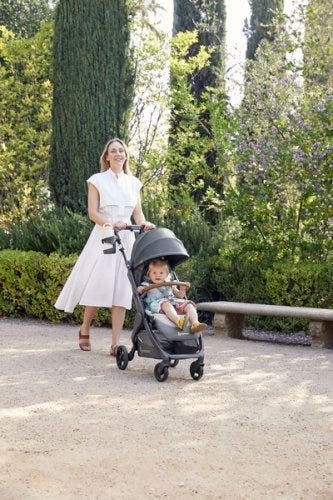

While baby carriers are fantastic for mobility and closeness, depending on the adventure of choice you might want to be a stroller along too.
There are a LOT of baby stroller options on the market. So we understand how confusing it can be to choose the one that’s right for your family. Not only are there a variety of brands, but a variety of strollers that serve different purposes.
There are a few types of strollers on the market:
- Full-sized stroller: This is typically the stroller parents thing of buying for all its versatility.
- Lightweight or umbrella stroller:These compact strollers are perfect for on-the-go adventures.
- Jogging stroller: Designed for parents who want to combine fitness with outdoor adventures.
- Double stroller: Designed for parents with multiple kids, especially twins.
- Car seat carrier: These strollers connect to a specific car seat. We don't typically recommend these as they can be unsafe for baby and uncomfortable for parents who are pushing.
Learn more about the types of strollers and which one would be best for you.
3. Breastfeeding and bottle feeding - FED is best! There is a lot of nuance that goes into a parent's choice to breastfeed vs. bottle feed, breastmilk feed or formula feed, and we are here to be your judgement free friends. Making sure your baby is getting proper nutrition is what is most important. Breastfeeding can be an extremely emotional and often painful journey and if you or your partner are feeling stressed out by the physical demands of breastfeeding, talk about it and find a solution. Many parents who will be returning to work choose to implement the bottle early on so their little one is familiar with switching between breast and bottle. Others choose to exclusively breastfeed. Whatever you choose, if it's right for your family, go for it! Keep in mind that everyone is different after they have a baby. Some people are ready to have visitors right away and thrive off of that attention. Others need more time to heal and be alone with the baby. For some people, it might vary greatly day by day. Make sure you are patient and supportive so they and the baby can have a speedy and happy recovery.
Sources
Combining Baby Carriers and Strollers
For the ultimate flexibility, consider using both a baby carrier and a stroller on your outings.
Combining both options allows you to adapt to different situations. Use the carrier for more rugged trails and switch to the stroller for smoother paths or when your baby needs a nap.
Transition Tips
- Smooth Transitions: Plan stops where you can easily switch from carrier to stroller.
- Pack Light: Only bring essentials to make transitions easier.
Tips for a Successful Adventure
Planning Ahead
- Route Planning: Choose baby-friendly trails and parks. Check local mom groups or outdoor groups and get recommendations for the best outings for kids.
- Check Weather Conditions: Avoid extreme heat or unpredictable weather. Even with our most breathable carriers, when it’s hot, it’s hot. And having two bodies against each other in the heat will be naturally hot and sticky already.
- Packing Checklist: Include diapers, snacks, water, sunscreen, and a first-aid kit. These all-position carriers have storage pockets where you can fit some of the items easily!
- Stay Hydrated and Nourished: Pack healthy snacks to keep energy levels up and bring plenty of water for both you and baby.
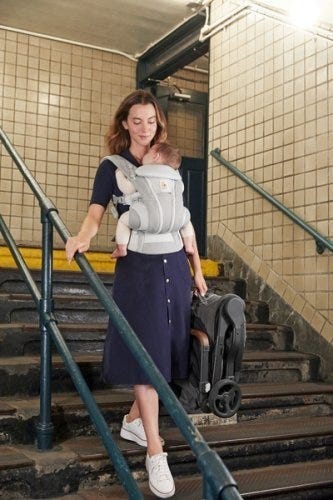

Summer adventures with your baby are a wonderful way to create lasting memories and enjoy the beauty of nature together. From baby carriers to strollers, Ergobaby products are designed to provide comfort and ease for both you and your little one. So, gear up, get outside, and explore the world with your baby by your side.
Ready to embark on your own summer adventures? Check out Ergobaby’s range of baby carriers and strollers to find the perfect match for your family’s needs. Visit our website today and start planning your next outdoor excursion!

















